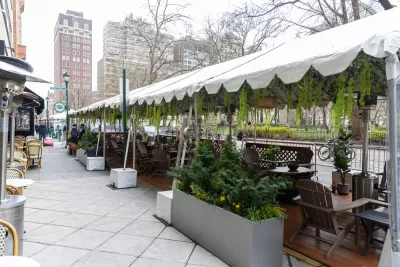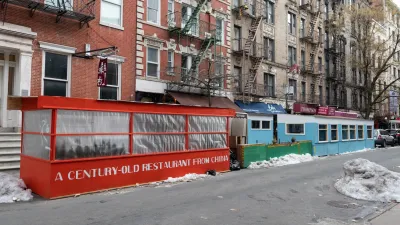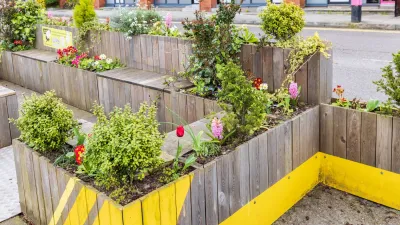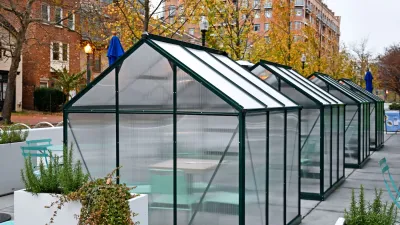A public space advocate outlines how Philadelphia’s city leaders could support the parklets, plazas, and other public space conversions that proliferated during the pandemic.

In an opinion piece on WHYY, Ariel Ben-Amos argues that Philadelphia should make it easier for residents to improve their local streets through interventions that reclaim public space and contribute to more vibrant, active communities.
Now is the time to reduce technical burdens and invest in programs and projects that empower communities, rather than slow down their ability to control their streets and make them safer, or a more attractive place to be.
Yet in the rush back toward ‘normalcy,’ Ben-Amos argues, the city is forgetting some valuable lessons from the pandemic. “When we citizens improve and steward their streets and create public space using parklets, pedestrian plazas, and benches, we calm traffic, make it easier for young and old to get around, and reduce environmental stress.”
With local elections coming up, Ben-Amos urges readers to support candidates who will invest in community efforts to improve public space and give citizens the tools to design and maintain public space projects. “Public space isn’t missing in communities because people don’t want to use them everywhere, it’s missing in marginalized communities because it’s harder to do the work there, with less funding and less civic infrastructure.” According to Ben-Ramos, “Philadelphians need a vision that includes a more democratic and more equitable approach to our collective front stoops.”

Maui's Vacation Rental Debate Turns Ugly
Verbal attacks, misinformation campaigns and fistfights plague a high-stakes debate to convert thousands of vacation rentals into long-term housing.

Planetizen Federal Action Tracker
A weekly monitor of how Trump’s orders and actions are impacting planners and planning in America.

San Francisco Suspends Traffic Calming Amidst Record Deaths
Citing “a challenging fiscal landscape,” the city will cease the program on the heels of 42 traffic deaths, including 24 pedestrians.

Defunct Pittsburgh Power Plant to Become Residential Tower
A decommissioned steam heat plant will be redeveloped into almost 100 affordable housing units.

Trump Prompts Restructuring of Transportation Research Board in “Unprecedented Overreach”
The TRB has eliminated more than half of its committees including those focused on climate, equity, and cities.

Amtrak Rolls Out New Orleans to Alabama “Mardi Gras” Train
The new service will operate morning and evening departures between Mobile and New Orleans.
Urban Design for Planners 1: Software Tools
This six-course series explores essential urban design concepts using open source software and equips planners with the tools they need to participate fully in the urban design process.
Planning for Universal Design
Learn the tools for implementing Universal Design in planning regulations.
Heyer Gruel & Associates PA
JM Goldson LLC
Custer County Colorado
City of Camden Redevelopment Agency
City of Astoria
Transportation Research & Education Center (TREC) at Portland State University
Jefferson Parish Government
Camden Redevelopment Agency
City of Claremont





























